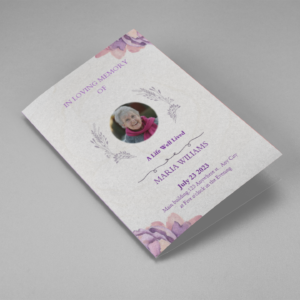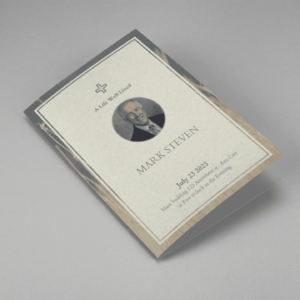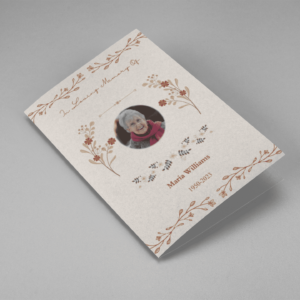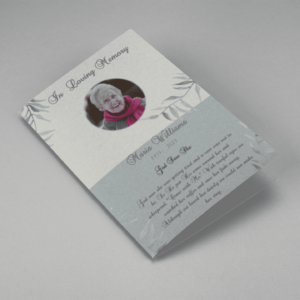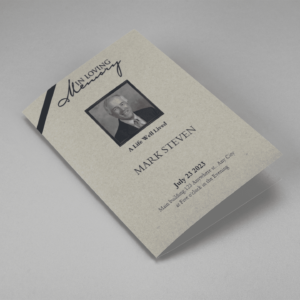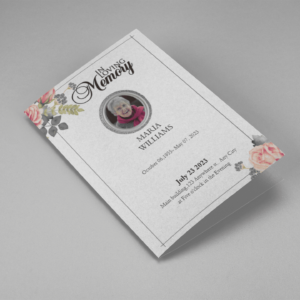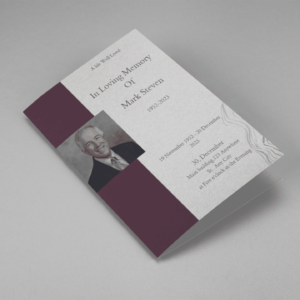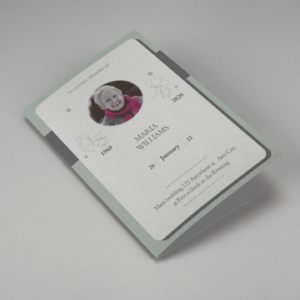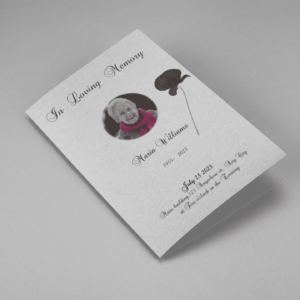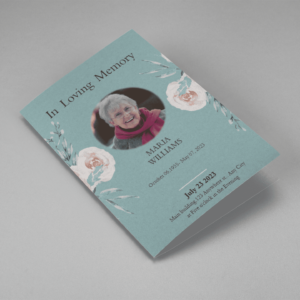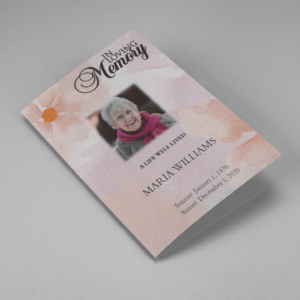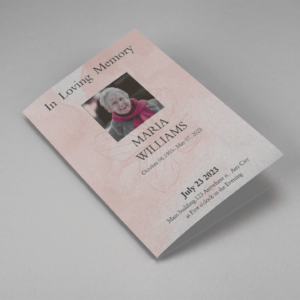When preparing a funeral program, choosing the right wording is crucial. The words you select can convey deep emotions, honor the life of the deceased, and provide comfort to the grieving family and friends.
Why is Funeral Wording Important?
The wording in a funeral program serves several important purposes:
- Honoring the Deceased: The words you choose can reflect the personality, beliefs, and values of the person who has passed away, ensuring that their memory is celebrated and cherished.
- Providing Comfort: Wording that offers sympathy, understanding, and hope can provide solace to those who are mourning.
- Guiding Attendees: The program can include important information about the order of service, speakers, and any special tributes or rituals, helping attendees navigate the funeral proceedings.
Tips for Choosing Funeral Wording
When selecting wording for a funeral programs, consider the following tips:
- Personalization: Incorporate personal anecdotes, memories, or quotes that were meaningful to the deceased or their loved ones.
- Clarity: Ensure that the wording is clear and easy to understand, especially when conveying important information about the service.
- Sensitivity: Be mindful of the emotions of the mourners, choosing words that offer comfort and support.
- Inclusivity: Acknowledge the diverse relationships and beliefs of those attending the funeral, using inclusive language that respects everyone’s perspective.
Examples of Funeral Wording for Funeral Programs
Cover Page
- “In Loving Memory of [Deceased’s Name]”
- “Celebrating the Life of [Deceased’s Name]”
- “Forever in Our Hearts: A Tribute to [Deceased’s Name]”
Order of Service
- “Opening Prayer”
- “Reading of Scriptures”
- “Eulogy”
- “Tributes from Family and Friends”
- “Closing Remarks”
Poems or Verses
- “Do not stand at my grave and weep,
I am not there; I do not sleep.”
- “Remember me when I am gone away,
Gone far away into the silent land.”
In Memoriam
- “In Loving Memory of a Beloved Husband, Father, and Friend”
- “Forever Remembered, Forever Missed”
- “Gone But Not Forgotten”
Closing Thoughts
- “May the memories of [Deceased’s Name] bring you comfort and peace.”“In the hearts of those who loved [Deceased’s Name], [He/She] will always be remembered.”
Funeral Templates
-
Searching for a Oak Leaf With Gold Oval Frame Half Page Funeral Program that is easy to print and amass and has a cutting-edge look? The Oak Leaf With Gold Oval Frame Half Page Funeral Program is the Perfect decision because it measures 8.5”x 5.5”.
- No Limitation on Content, Edit anything
- Edit anytime – unlimited revisions even after purchased
- Get a printable PDF downloaded to get it printed on your own.
-
Searching for a Brown and White Classic Funeral Program Half Page Program that is easy to print and amass and has a cutting-edge look? The Brown and White Classic Funeral Program Half Page Program is the Perfect decision because it measures 8.5”x 5.5”.
- No Limitation on Content, Edit anything
- Edit anytime – unlimited revisions even after purchased
- Get a printable PDF downloaded to get it printed on your own.
-
Searching for a Purple Elegant Watercolor Half Page Funeral Program Template that is easy to print and amass and has a cutting-edge look? The Purple Elegant Watercolor Half Page Funeral Program Template is the Perfect decision because it measures 8.5”x 5.5”.
- No Limitation on Content, Edit anything
- Edit anytime – unlimited revisions even after purchased
- Get a printable PDF downloaded to get it printed on your own.
-
Searching for a Cream and Green Photo Obituary Half Page Program that is easy to print and amass and has a cutting-edge look? The Cream and Green Photo Obituary Half Page Program is the Perfect decision because it measures 8.5”x 5.5”.
- No Limitation on Content, Edit anything
- Edit anytime – unlimited revisions even after purchased
- Get a printable PDF downloaded to get it printed on your own.
-
Searching for a Cream Simple Elegant Photo Church Half Page Program that is easy to print and amass and has a cutting-edge look? The Cream Simple Elegant Photo Church Half Page Program is the Perfect decision because it measures 8.5”x 5.5”.
- No Limitation on Content, Edit anything
- Edit anytime – unlimited revisions even after purchased
- Get a printable PDF downloaded to get it printed on your own.
-
Searching for a Samovar Silver Half Page Funeral Program Template that is easy to print and amass and has a cutting-edge look? The Samovar Silver Half Page Funeral Program Template is the Perfect decision because it measures 8.5”x 5.5”.
- No Limitation on Content, Edit anything
- Edit anytime – unlimited revisions even after purchased
- Get a printable PDF downloaded to get it printed on your own.
-
Searching for an Elegant Beige Half Page Funeral Program Template that is easy to print and amass and has a cutting-edge look? The Elegant Beige Half-Page Funeral Program Template is the Perfect decision because it measures 8.5”x 5.5”.
- No Limitation on Content, Edit anything
- Edit anytime – unlimited revisions even after purchased
- Get a printable PDF downloaded to get it printed on your own.
-
Searching for a White Floral Pro Half Page Funeral Program Template that is easy to print and amass and has a cutting-edge look? White Floral Pro Half Page Funeral Program Template is the Perfect decision because it measures 8.5”x 5.5”.
- No Limitation on Content, Edit anything
- Edit anytime – unlimited revisions even after purchased
- Get a printable PDF downloaded to get it printed on your own.
-
Searching for a Grey and Burgundy Elegant Half Page Funeral Program Template that is easy to print and amass and has a cutting-edge look? Grey and Burgundy Elegant Half Page Funeral Program Template is the Perfect decision because it measures 8.5”x 5.5”.
- No Limitation on Content, Edit anything
- Edit anytime – unlimited revisions even after purchased
- Get a printable PDF downloaded to get it printed on your own.
-
Searching for a Soft Green and Grey Minimalist Floral Half Page Funeral Program Template that is easy to print and amass and has a cutting-edge look? Soft Green and Grey Minimalist Floral Half Page Funeral Program Template is the Perfect decision because it measures 8.5”x 5.5”.
- No Limitation on Content, Edit anything
- Edit anytime – unlimited revisions even after purchased
- Get a printable PDF downloaded to get it printed on your own.
-
Searching for a Gray Elegant Oval Frame Half Page Funeral Program Template that is easy to print and amass and has a cutting-edge look? Gray Elegant Oval Frame Half Page Funeral Program Template is the Perfect decision because it measures 8.5”x 5.5”.
- No Limitation on Content, Edit anything
- Edit anytime – unlimited revisions even after purchased
- Get a printable PDF downloaded to get it printed on your own.
-
Searching for a Blue Organic Minimal Half Page Funeral Program Template that is easy to print and amass and has a cutting-edge look? Blue Organic Minimal Half Page Funeral Program Template is the Perfect decision because it measures 8.5”x 5.5”.
- No Limitation on Content, Edit anything
- Edit anytime – unlimited revisions even after purchased
- Get a printable PDF downloaded to get it printed on your own.
-
Searching for a Pink and Orange Watercolour Half Page Funeral Program Template that is easy to print and amass and has a cutting-edge look? Pink and Orange Watercolour Half Page Funeral Program Template is the Perfect decision because it measures 8.5”x 5.5”.
- No Limitation on Content, Edit anything
- Edit anytime – unlimited revisions even after purchased
- Get a printable PDF downloaded to get it printed on your own.
-
Searching for a Pink Floral Paper Half Page Funeral Program Template that is easy to print and amass and has a cutting-edge look? Pink Floral Paper Half Page Funeral Program Template is the Perfect decision because it measures 8.5”x 5.5”.
- No Limitation on Content, Edit anything
- Edit anytime – unlimited revisions even after purchased
- Get a printable PDF downloaded to get it printed on your own.
Funeral Programs : Helping Videos
Frequently Asked Questions On Funeral Wording For Funeral Program
What should I include in the funeral program wording?
The funeral program wording should include details about the deceased, such as their name, date of birth, and date of passing. It should also include information about the order of service, speakers, and any special tributes or rituals.
How can I personalize the funeral program wording?
Personalizing the funeral program wording can be done by including personal anecdotes, memories, or quotes that were meaningful to the deceased. You can also customize the wording to reflect the deceased’s personality, beliefs, and values.
What tone should the funeral program wording have?
The tone of the funeral program wording should be respectful, empathetic, and comforting. It should convey sympathy and understanding to those who are mourning.
Can I include religious or spiritual elements in the funeral program wording?
Yes, you can include religious or spiritual elements in the funeral program wording if they were important to the deceased or their family. Be sure to use language that is respectful and inclusive of all attendees’ beliefs.
How can I ensure that the funeral program wording is clear and easy to understand?
To ensure that the funeral program wording is clear and easy to understand, avoid using overly complex language or jargon. Use simple and straightforward wording that conveys the necessary information clearly.




